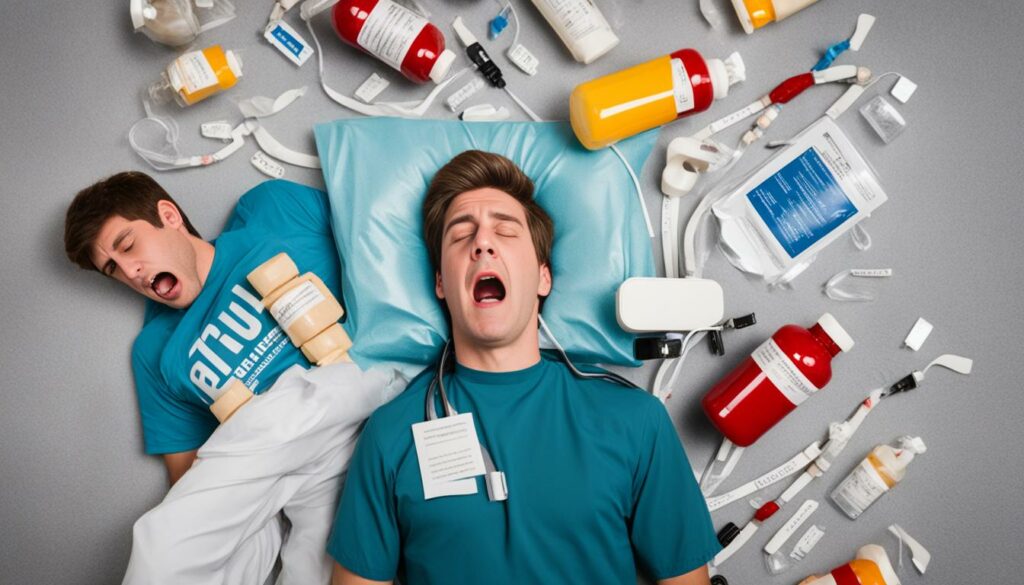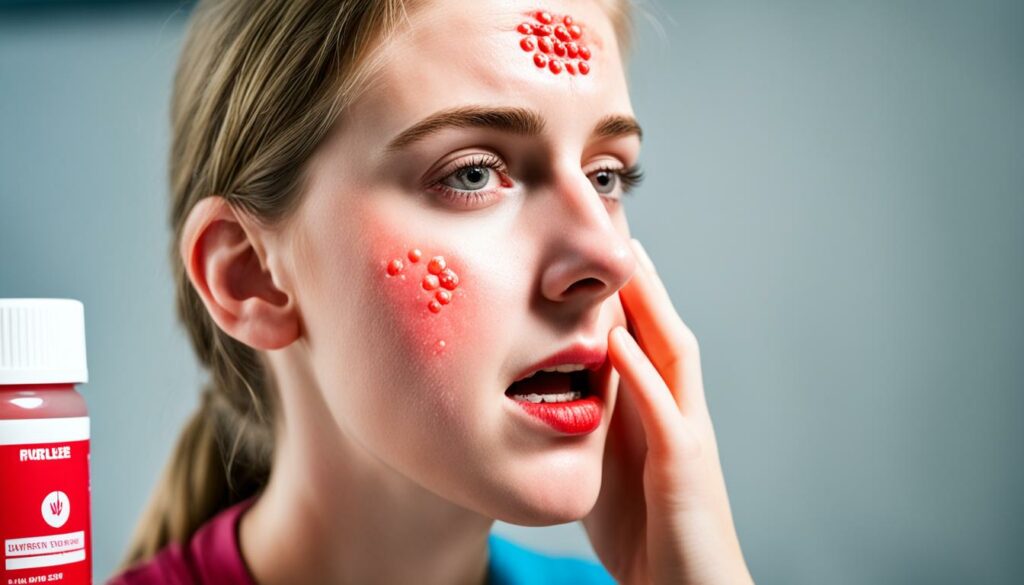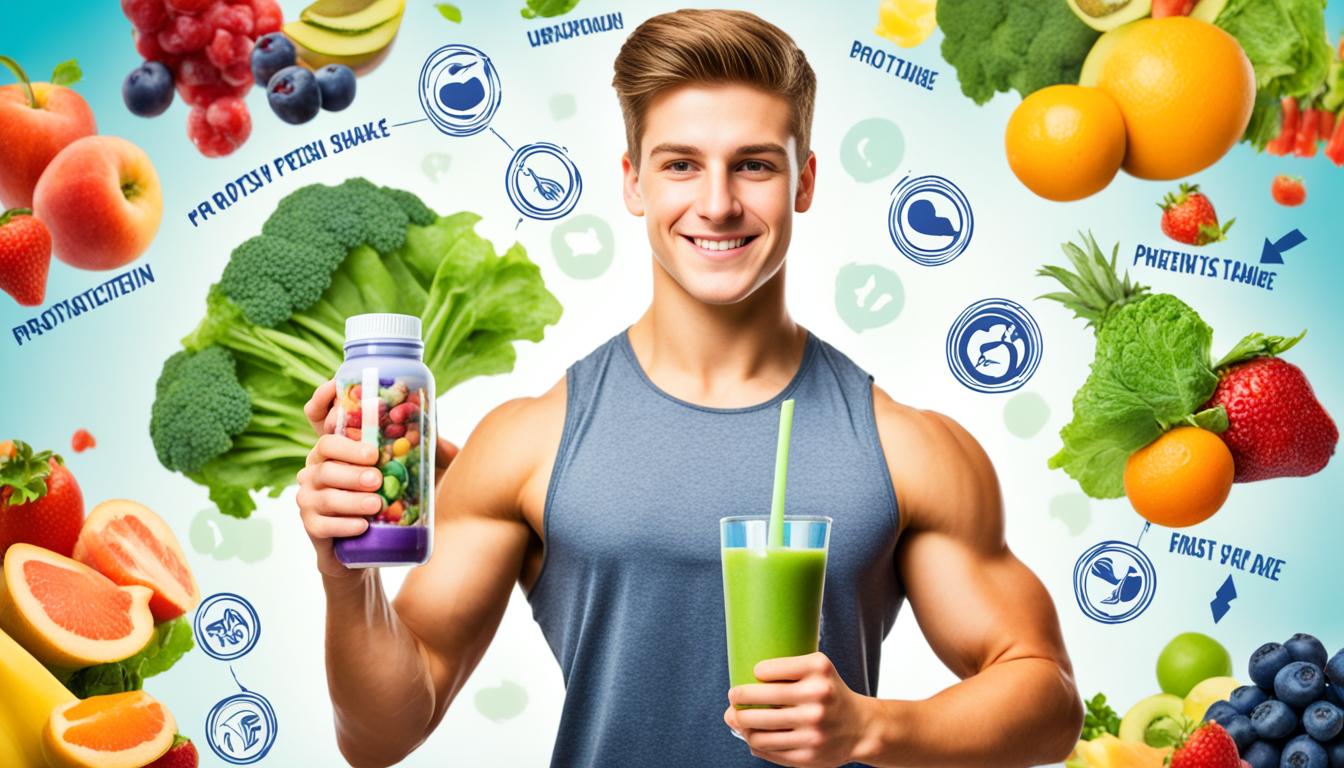Can Teens Drink Protein Shakes? Facts & Myths
Protein shakes for teens have become a popular topic of debate and concern in recent years. Parents, educators, and healthcare professionals are seeking answers to questions like: Can teens drink protein shakes? Is protein shake consumption safe for teenagers? Are protein shakes appropriate for adolescents? It’s important to separate the facts from the myths and gain a clear understanding of the potential benefits and risks associated with protein shakes for teenagers.
Key Takeaways:
- Protein shake consumption among teenagers is a topic of concern.
- Individual health conditions should be considered before teenagers incorporate protein shakes into their diet.
- Consulting healthcare professionals or registered dietitians is crucial for determining the appropriate amount of protein shakes for teenagers.
- The daily protein requirement for teenagers varies based on age, sex, and activity level.
- Protein shakes can provide benefits, but should not replace a well-rounded diet.
The Tragic Case of Rohan Godhania

In 2020, a 16-year-old boy named Rohan Godhania tragically died three days after consuming a protein shake. It was later discovered that he had a rare genetic condition called ornithine transcarbamylase deficiency, which was exacerbated by the high protein content in the shake. This case highlights the importance of understanding individual health conditions and seeking professional guidance before incorporating protein shakes into a teenager’s diet.
Protein shake death can be a tragic outcome, especially when underlying health conditions come into play. Teenagers need to be aware of the potential risks and consult with healthcare professionals to ensure their well-being. The story of Rohan Godhania serves as a heartbreaking reminder of the importance of informed decision-making when it comes to teenage protein shake consumption.
Incorporating a relevant quote into the section:
“This devastating incident underscores the significance of personalized approach to nutrition and the necessity of healthcare guidance for teenagers considering protein shakes as part of their diet.” – Dr. Amanda Lopez, Registered Dietitian
By understanding the risk factors associated with protein shakes, teenagers can make informed choices that prioritize their health and well-being.
Health Risks of Protein Shakes for Teens
Protein shakes, when consumed irresponsibly, can pose significant health risks to teenagers. Excessive protein intake can lead to several adverse effects, including digestive issues, acne, nausea, bloating, and decreased appetite. It is crucial for teenagers and their parents to be aware of these potential risks and take necessary precautions.
While protein shakes may seem like a quick and easy way to boost protein intake, it is essential to consider the overall balance of a teenager’s diet and consult with healthcare professionals for personalized guidance.
Relevant Statistics:
According to a survey conducted by the American Academy of Pediatrics:
- Among teenagers who reported consuming protein shakes regularly, 32% experienced digestive issues.
- 15% of teenagers who consumed protein shakes without professional guidance experienced weight gain.
Image:
| Health Risks | Precautions |
|---|---|
| 1. Digestive issues | Consume protein shakes in moderation and adjust protein intake based on individual needs. |
| 2. Acne | Ensure good hygiene practices and consider alternative sources of protein if acne worsens. |
| 3. Nausea and bloating | Take protein shakes with plenty of water and consider a lower protein content option if symptoms persist. |
| 4. Decreased appetite | Consult healthcare professionals for guidance on appropriate protein intake and overall nutritional needs. |
Teenagers should prioritize a balanced diet and obtain protein from a variety of sources such as lean meats, poultry, fish, dairy products, legumes, and nuts.
Understanding Protein Shake Safety

While protein shakes can be a convenient way to increase protein intake, it is essential to prioritize the safety and well-being of teenagers. With the rising popularity of protein shakes among adolescents, it is important to understand the potential risks and guidelines for their consumption.
High doses of protein in shakes can lead to adverse effects that may impact teenagers’ health. It is crucial to be aware of these potential risks, which can include:
- Bowel issues: Excessive protein intake can cause digestive problems such as constipation or diarrhea.
- Acne: Some individuals may experience an increase in acne breakouts due to the hormonal effects of protein consumption.
- Nausea and bloating: Protein shakes can cause feelings of nausea and bloating, especially if consumed in large quantities or on an empty stomach.
- Reduced appetite: Protein shakes may temporarily suppress appetite, which can interfere with an individual’s overall nutrition and calorie intake.
To ensure the safe consumption of protein shakes, it is recommended that teenagers consult with a healthcare professional or a registered dietitian. These experts can provide personalized guidance based on individual needs and health status.
Expert Advice: “When it comes to protein shake consumption, it is essential for teenagers to consider their overall dietary needs and goals. Consulting with a healthcare professional or a registered dietitian can help determine the appropriate amount of protein shakes to incorporate into their diet while maintaining a balanced and nutritious eating plan.” – Dr. Samantha Thompson, Registered Dietitian
Note: It is important to remember that protein shakes should never replace a well-rounded diet. They should be used as a supplement and not as a sole source of nutrition. A diverse range of whole foods is essential for meeting nutritional needs.
Now that we understand the potential risks associated with protein shake consumption, it’s important to explore the recommended guidelines for teenagers.
Protein Shake Guidelines for Teenagers
Teenagers should follow these guidelines to ensure safe and appropriate protein shake consumption:
- Consult with a healthcare professional or a registered dietitian to determine the appropriate amount of protein shakes based on individual needs and health status.
- Choose protein shakes that are specifically formulated for teenagers and meet quality and safety standards.
- Read the labels carefully to ensure the shake contains a balanced combination of macronutrients and does not exceed the recommended daily intake of protein for their age and sex.
- Always mix protein shakes according to the instructions provided by the manufacturer to ensure proper dilution.
- Avoid relying solely on protein shakes for nutrition. Encourage teenagers to consume a variety of whole foods to obtain essential nutrients.
By following these guidelines and seeking professional advice, teenagers can safely incorporate protein shakes into their diet to support their nutritional needs without compromising their health.
Recommended Protein Intake for Teens
Protein plays a crucial role in the growth and development of teenagers. The daily recommended protein intake for teens varies based on factors such as age, sex, and activity level. It is essential for teenagers to consume an adequate amount of protein to support their overall health and wellbeing.
| Age | Sex | Recommended Daily Protein Intake |
|---|---|---|
| 13-18 years | Boys | 56 grams per day |
| 13-18 years | Girls | 46 grams per day |
Teenagers can meet their protein needs through a balanced diet that includes various sources of protein. Here are some examples:
- Lean meats, such as chicken, turkey, and beef
- Poultry, such as chicken and turkey
- Fish and seafood
- Dairy products, such as milk, yogurt, and cheese
- Legumes, such as beans, lentils, and chickpeas
- Nuts and seeds
It is important for teenagers to choose protein sources that are low in saturated and trans fats. They should also aim for a variety of protein-rich foods to ensure they receive all essential amino acids.
Remember, protein shakes can be a convenient supplement, but they should not replace a well-rounded diet. It is always best to consult with a healthcare professional or a registered dietitian to determine the appropriate amount of protein shakes to include in a teenager’s diet.
Potential Benefits of Protein Shakes for Teenagers

Protein shakes can provide several benefits for teenagers, especially for those who engage in intense physical activity or participate in sports. These shakes are a convenient and quick way to increase protein intake, which plays a crucial role in supporting muscle growth and repair in the body.
One of the key benefits of protein shakes for teenagers is their ability to enhance recovery after exercise. Intense workouts can strain the muscles and deplete their energy stores. Protein shakes, when consumed shortly after exercise, can help replenish these energy stores and kickstart the recovery process.
Additionally, protein shakes can serve as a valuable source of protein for teenagers when whole food options may not be readily available. They are portable, easy to prepare, and can be consumed on the go, making them a convenient choice for busy teenagers who need a quick protein boost.
It is important to note that protein shakes should not replace a well-rounded diet. While they offer advantages in terms of convenience and protein supplementation, they should be used in conjunction with proper nutrition and a balanced diet that includes a variety of whole foods.
Here is a breakdown of the potential benefits of protein shakes for teenagers:
| Benefits of Protein Shakes for Teenagers |
|---|
| Supports muscle growth and repair |
| Enhances recovery after exercise |
| Provides a convenient source of protein |
By incorporating protein shakes into their routine responsibly, teenagers can enjoy the benefits of improved physical performance and recovery.
Allergic Reactions and Other Considerations

When it comes to protein shakes, it is important to be aware of potential allergic reactions, especially for teenagers who may have food allergies or be lactose intolerant. Some protein shakes contain ingredients like milk, soy, or whey, which can trigger allergic responses in susceptible individuals. It is crucial to read the labels carefully and consult with a healthcare professional if you have any known allergies or concerns.
Aside from allergic reactions, another consideration when consuming protein shakes is their calorie content. Protein shakes can be high in calories, especially if they are made with added sugars, sweeteners, or fats. It is essential to be mindful of portion sizes and incorporate protein shakes into a well-balanced diet. Overconsumption of calories from protein shakes without adequate physical activity may contribute to weight gain in teenagers.
It is also important to note that excessive protein intake, whether from protein shakes or other sources, can have potential side effects on teenage health. Excessive protein intake can lead to dehydration as the body works to process and eliminate the extra protein. Kidney damage and an increased risk of kidney stones are also possible long-term consequences of consistently consuming excessive amounts of protein.
To provide a clear visual representation of recommended daily protein intake for teens and the potential side effects of protein shake consumption, the following table has been prepared:
| Recommended Daily Protein Intake for Teens | Potential Side Effects of Protein Shake Consumption |
|---|---|
|
|
It is crucial for teenagers to understand these potential risks and use protein shakes responsibly. Consulting with a healthcare professional or registered dietitian can provide personalized guidance on protein intake and help ensure the safety and appropriateness of protein shake consumption for individual teenagers.
Protein Shakes and Body Image Issues
The portrayal of muscular bodies in the media has had a significant impact on body image among teenage boys. The constant exposure to idealized physiques can contribute to body dissatisfaction and an unhealthy obsession with gaining muscle mass. Paired with the popularity of protein shakes as a means to achieve these desired results, it is crucial to address the potential impact on body image and overall well-being.
Teenagers who consume protein shakes may be seeking to enhance their physical appearance and adhere to societal standards of attractiveness. However, this pursuit can sometimes lead to an unhealthy preoccupation with body image and a condition known as muscle dysmorphia.
Muscle dysmorphia, also referred to as “bigorexia,” is a psychological disorder characterized by a distorted perception of one’s body. Individuals with muscle dysmorphia have an excessive preoccupation with their perceived lack of muscle mass and an intense desire to gain more muscle, often regardless of their actual physical appearance.
It is crucial to educate teenagers about the importance of developing a healthy body image and a balanced approach to nutrition and fitness. Encouraging them to focus on overall health, self-acceptance, and body positivity can help prevent the development of body image issues and related conditions.
“The constant exposure to idealized physiques can contribute to body dissatisfaction and an unhealthy obsession with gaining muscle mass.”
Instead of solely focusing on appearance, teenagers should be encouraged to prioritize their overall well-being. Engaging in regular physical activity that they enjoy, eating a balanced diet that includes a variety of nutritious foods, and maintaining a positive mindset are key elements in fostering a healthy body image.
Here are some tips to promote a healthy body image and positive self-esteem:
- Encourage open and honest conversations about body image and media influences.
- Promote a diverse representation of bodies and emphasize that beauty comes in all shapes and sizes.
- Highlight the importance of self-care and self-compassion, focusing on overall health rather than solely on physical appearance.
- Encourage participation in activities that promote self-expression and build confidence.
Real-Life Story: Ethan’s Journey to Body Positivity
Ethan, a 17-year-old high school student, had been struggling with body image issues and a desire to have a muscular physique. He had become fixated on achieving the “perfect” body after seeing images of heavily muscled athletes on social media.
With the support of his family and a mental health professional, Ethan embarked on a journey of self-acceptance and body positivity. He learned to appreciate his body for its strength and capabilities rather than its appearance alone.
Today, Ethan focuses on maintaining a well-rounded and balanced lifestyle. He engages in activities he enjoys, such as playing basketball and hiking, and fuels his body with a nutritious diet that includes a variety of food groups. Ethan now realizes that true happiness and confidence come from within, not from conforming to societal ideals of beauty.
Steroid Use and Performance-Enhancing Substances
The use of steroids and other performance-enhancing substances among teenagers is a concerning issue. While protein shakes are not equivalent to steroids, it is noteworthy that the popularity of protein shakes among adolescents can potentially lead to a greater likelihood of experimenting with other substances. This trend highlights the need for parents, educators, and healthcare professionals to be aware of the potential risks and address it through education and guidance.
“It is crucial for parents, educators, and healthcare professionals to be vigilant and proactive in educating teenagers about the dangers of steroid use and the deceptive allure of performance-enhancing substances.”
Teenagers, influenced by societal pressure and the desire to achieve exceptional athletic performance, may be tempted to explore the use of these substances. It is crucial to foster an open and supportive dialogue around the topic, allowing teenagers to express their concerns and ask questions in a safe environment.
By providing accurate information about the harmful effects of steroid use and the risks associated with performance-enhancing substances, parents, educators, and healthcare professionals can help teenagers make informed decisions and prioritize their long-term health and well-being.
Furthermore, it is important to emphasize the significance of natural and sustainable approaches to fitness and athletic performance. Encouraging teenagers to focus on proper nutrition, exercise, and holistic training methods is essential in cultivating a healthy mindset and reinforcing positive behaviors.
The Role of Education
Education plays a crucial role in addressing the issue of steroid use and performance-enhancing substances among teenagers. By implementing comprehensive educational programs in schools, sports organizations, and community centers, we can equip adolescents with the knowledge and critical thinking skills necessary to make informed choices.
- Teach teenagers about the potential health risks and long-term consequences associated with steroid use and performance-enhancing substances.
- Provide resources and support networks where teenagers can seek guidance and ask questions without fear of judgment.
- Collaborate with coaches, trainers, and mentors to emphasize the importance of fair play, sportsmanship, and ethical approaches to athletic performance.
By empowering teenagers with the necessary information and resources, we can create a safe and supportive environment that encourages healthy habits, discourages the use of steroids, and promotes a positive approach to fitness and athletic achievement.
| Statistics | Effects | Prevention |
|---|---|---|
| According to a national survey, approximately 6% of high school students in the United States have reported using steroids at least once. | The use of steroids in teenagers can have a range of harmful effects, including hormonal imbalances, stunted growth, liver damage, cardiovascular problems, and psychological issues such as aggression and mood swings. | Prevention strategies include comprehensive education, providing positive role models, promoting alternatives to steroid use, implementing drug testing in sports, and reinforcing the importance of natural and ethical approaches to fitness. |
Conclusion
To conclude, protein shakes can be a valuable addition to a teenager’s diet when used responsibly and under the guidance of healthcare professionals. They can provide support for growth, muscle repair, and recovery, especially for teenagers who are physically active or engage in sports. However, it is crucial to remember that protein shakes should not replace a balanced diet that includes a variety of whole foods.
Consulting with healthcare professionals, such as registered dietitians, can help teenagers determine the appropriate amount of protein shakes to include in their diet based on their individual needs and health status. It is also important to educate teenagers about the potential risks and side effects of excessive protein intake, such as bowel issues and acne.
Furthermore, promoting open and honest discussions around body image and overall health is essential. Teenagers should be encouraged to prioritize a healthy body image and understand that protein shakes alone are not a shortcut to achieving their desired physique. By empowering teenagers with knowledge and guiding them towards a balanced approach to nutrition and fitness, we can help them make informed decisions for their well-being.
FAQ
Can teenagers drink protein shakes?
Yes, teenagers can consume protein shakes as part of a balanced diet. However, it is important to consider individual health conditions and consult with a healthcare professional or registered dietitian for personalized guidance.
Are protein shakes safe for teenagers?
Protein shakes can be safe for teenagers when consumed in moderation. It is important to be aware of potential risks such as adverse effects, allergic reactions, and excessive protein intake. Consulting with a healthcare professional is recommended.
How much protein do teenagers need per day?
The daily protein requirement for teenagers varies based on factors like age, sex, and activity level. On average, teenage boys need around 56 grams of protein per day, while teenage girls need around 46 grams. It is important to obtain protein from a balanced diet.
What are the benefits of protein shakes for teenagers?
Protein shakes can provide benefits for teenagers who engage in intense physical activity or participate in sports. They can support muscle growth and repair, enhance recovery after exercise, and serve as a convenient protein source when whole food options are not readily available.
Can protein shakes cause allergic reactions?
Yes, protein shakes can potentially cause allergic reactions, especially for teenagers with food allergies or lactose intolerance. It is important to read labels carefully and choose protein shakes that are safe for individual dietary needs.
Can protein shakes contribute to body image issues?
The portrayal of muscular bodies in the media, combined with the popularity of protein shakes for muscle growth, can contribute to body image issues among teenagers. It is vital to promote a healthy body image and educate teenagers about nutrition and fitness in a balanced manner.
Do protein shakes lead to steroid use among teenagers?
While protein shakes themselves are not equivalent to steroids, their popularity among adolescents can potentially increase the likelihood of experimenting with other performance-enhancing substances. It is crucial for parents, educators, and healthcare professionals to address this trend through education and guidance.
Should protein shakes replace a well-rounded diet for teenagers?
No, protein shakes should not replace a well-rounded diet for teenagers. They should be used as a supplement to support protein intake, not as a substitute for whole foods. It is important to prioritize a balanced diet that includes a variety of nutrient-rich sources of protein.
What is the conclusion on protein shakes for teens?
In conclusion, protein shakes can be a beneficial addition to a teenager’s diet when used responsibly and in conjunction with proper nutrition. It is important for teenagers to be aware of potential risks, consult with healthcare professionals, and prioritize a healthy body image and overall well-being.
Source Links
- https://www.verywellfamily.com/protein-shakes-for-kids-2634707
- https://abcnews.go.com/Health/teens-turn-protein-shakes-pump/story?id=17760126
- https://timesofindia.com/life-style/health-fitness/health-news/protein-shake-triggers-fatal-genetic-condition-in-teen-uk-official-says-such-drinks-should-carry-warning-labels/photostory/101360984.cms







